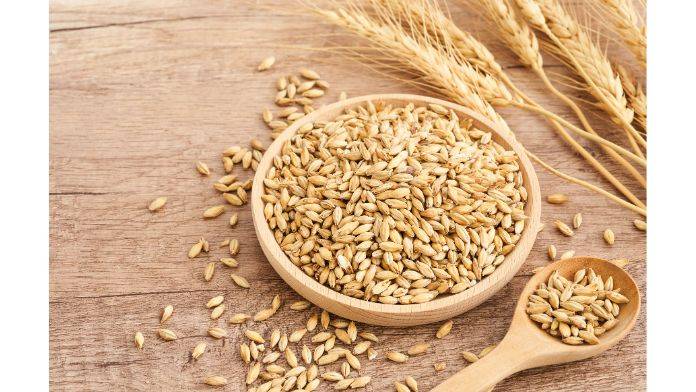In a world filled with dietary trends and fads, there’s one nutritional powerhouse that has stood the test of time – whole grains. From hearty oats to earthy quinoa, these nutrient-dense grains have been a staple in mortal diets for centuries, and for good reason. They offer a plethora of fitness benefits that contribute to overall well-being and vitality. So, let’s dive into the wholesome goodness and uncover the incredible health benefits of consuming whole grains.
What Are Whole Grains


Whole grains contain the entire seed, or kernel, of the plant in its unprocessed state.
A kernel has three edible sections:
Brand: Fiber, B vitamins, copper, iron, magnesium, phosphorus, potassium, magnesium, antioxidants, and phytochemicals are found on the outer layer of the kernel.
Germ: Packed full of phytochemicals, healthful fats, and vitamin E, this section of the kernel can sprout into a new plant.
The majority of the kernel, or endosperm, is made up of starchy carbs and proteins.
Whole grains include, for instance:
- Bulgur
- Whole-wheat flour
- Cornmeal
- Faro
- Oatmeal
You can eat whole grains in their whole forms or process them into foods like whole-grain bread and pasta. However, not all pasta and bread are composed of whole grains. Certain brands employ enriched or refined grains. Refined grains have one or more of the three kernel components removed, in contrast to whole grains. For instance, white or wheat flour will remove the bran and germ. Because they lose fiber and minerals, refined grains are less nutrient-dense than whole grains.
Refined grains that have been enhanced with iron and the B vitamins thiamin, riboflavin, folic acid, and niacin are called enriched grains. Rich grains are deficient in protein and fiber. One Remember that just because bread has the typical brown appearance of whole grain bread, it does not necessarily guarantee that whole grains are used in its production. It can be tinted with brown sugar, molasses, or caramel coloring.
What Nutrients Are in Whole Grains
Any whole grain bran is a good source of fiber. The components of whole grains differ. The following nutrients, among others, may be among them:
- Vitamin A.
- Thiamin is another name for vitamin B-1.
- Riboflavin is another name for vitamin B-2.
- Niacin is another name for vitamin B-3.
- Pyridoxine is another name for vitamin B-6.
- Folate is another name for vitamin B-9.
- Vitamin E.
- Iron.
- Magnesium.
- Phosphorus.
- Selenium.
Exploring the Health Benefits
Nutrient Powerhouses


Whole grains are packed with essential nutrients that are vital for our health. They are rich in complex carbohydrates, which provide a steady release of power, keeping us fueled throughout the day. Additionally, they are excellent sources of fiber, which aids digestion, boosts satiety and helps maintain a healthy weight. Moreover, whole, healthy grains contain an array of vitamins and minerals, including B vitamins, iron, magnesium, and selenium, which are crucial for various bodily functions, such as metabolism, immune function, and bone health.
Reduce Your Heart Disease Risk
Lowering the risk of heart disease, the world’s leading cause of death is one of the major health benefits of whole grains. Studies have shown that regularly incorporating whole grains into your diet can help lower the risk of heart disease. The yarn, particularly soluble fiber found in whole grains, helps lower cholesterol levels, thereby reducing the risk of plaque buildup in the arteries. Additionally, whole grains contain antioxidants and phytochemicals that have anti-inflammatory properties, further supporting heart health.
Weight Management


For those looking to maintain a healthy weight or even shed some pounds, whole grain health benefits can be a valuable ally. Their high fiber content helps promote satiety, keeping hunger at bay and reducing overall calorie intake. Furthermore, the complex carbohydrates in whole grains benefits provide a sustained source of energy, preventing the energy crashes often associated with refined grains. Including whole grains in your diet can help you feel fuller for longer, making it easier to manage your weight effectively.
Reduce the Chance of Having a Stroke
Additionally, whole grains may reduce your risk of stroke.
Those who consumed the most whole grains had a 14% lower risk of stroke than those who ingested the fewest, according to an analysis of six trials involving over 250,000 participants.
In addition, a few ingredients found in whole grains—like fiber, vitamin K, and antioxidants—can lower your chance of stroke.
The DASH and Mediterranean diets, which both aim to reduce your risk of stroke, also call for whole grains.
Digestive Health


A healthy digestive system is important for overall well-being, and whole grains play a significant role in supporting digestive health. The fiber in whole grains adds bulk to stool, encouraging regular bowel movements and preventing constipation. Moreover, certain types of fiber found in whole grains health benefits, known as prebiotics, serve as grain food for beneficial gut bacteria, promoting a healthy gut microbiome. A proportional and diverse gut microbiome is associated with improved digestion, immune function, and even mood regulation.
Diabetes Management
For individuals managing diabetes or looking to prevent its onset, whole grains offer valuable benefits. Unlike refined grains, which can cause rapid spikes in blood sugar levels, whole grains have a lower glycemic index, leading to more stable blood sugar levels. The fiber and complicated carbohydrates in whole grains slow down the absorption of sugar into the bloodstream, helping to regulate blood sugar levels. Additionally, the magnesium content in whole grains has been linked to improved insulin sensitivity, further supporting diabetes management.
Reduced Cancer Risk
Incorporating whole grains into your diet may also help reduce the risk of particular types of cancer. Studies have suggested that the fiber, antioxidants, and other phytochemicals present in whole grains may have protective effects against various cancers, including colorectal cancer. Additionally, the high fiber content of whole grains helps boost healthy digestion and regular bowel movements, which is associated with a reduced risk of colon cancer.
Diminish Long-Term Inflammation
Many chronic illnesses have inflammation as their primary cause.
Whole grains can help lower inflammation, according to certain research.
According to one study, women who consumed the most whole grains had a lower risk of passing away from chronic diseases linked to inflammation.
Furthermore, a recent study found that when individuals with poor diets switched from refined to whole wheat products, their levels of inflammatory markers decreased.
The findings of these and other studies back up public health recommendations to switch to whole grains from processed grains for the majority of them.
Incorporating Whole Grains Into Your Diet
Now that we’ve explored the myriad health benefits of consuming whole grains, you may be wondering how to incorporate them into your diet. Fortunately, there are plenty of delicious and versatile options to choose from. Here are some simple ways to add more whole grains to your meals:
- Start your day with a nutritious bowl of oatmeal topped with fresh fruit and nuts.
- Swap out refined grains for whole grains in your favorite recipes, such as whole wheat pasta or brown rice instead of white rice.
- Enjoy a hearty sandwich on the best whole grain breads, loaded with your favorite veggies and lean protein.
- Snack on air-popped popcorn or whole grain crackers with hummus for a satisfying midday treat.
- Experiment with ancient grains like quinoa, farro, or bulgur in salads, soups, or as a side dish.
Conclusion
The health benefits of ingesting whole grains are undeniable. From boosting heart health and weight management to supporting digestive health and diabetes management, these nutritious grains offer a wide range of benefits that contribute to overall well-being. By incorporating a type of whole grains into your diet, you can nourish your body with essential nutrients and enjoy delicious, satisfying meals that support your whole grains for better health and vitality.


